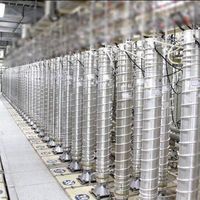Iran Economy is Reeling Under Sanctions, Khamenei Chief Admits
Iran’s economy is struggling as sanctions bite hard, the Supreme Leader’s chief of staff has said in a rare admission by the regime.
In unusually frank remarks, Gholamhossein Mohammadi Golpayegani said: "We are facing difficulties due to sanctions; however, the government will find a way to overcome these problems."
His comments to Iranian media on Friday come amid grim data on the state of the economy. The Central Bank of Iran (CBI) last month reported a 52.3% inflation rate for 2023, and there are widespread shortages including of gasoline despite the country’s major oil resources.
The sanctions are being enforced against Iran because of its nuclear weapons programme and support for terror groups, but Supreme Leader Ali Khamenei and his loyalists have been reluctant to acknowledge the strain caused to the economy. Instead, they claim the sanctions are opportunities for growth and development and could foster national unity.
"Weapon developments is an example of turning sanctions into opportunities," Khamenei stated during a speech in April. "Sanctions cannot impact Iranians because they need no external help."
Inflationary pressures have been exacerbated by the plummeting value of the Iranian currency. Over the decades, devaluations of the rial have caused millions of Iranians to fall into poverty.
The recent foreign policy decisions of the Islamic Republic have made things substantially more difficult for the economy. The foreign exchange market in Tehran witnessed an unprecedented surge during the first two weeks of April, with the dollar briefly reaching 700,000 rials amid worsening tensions between Iran and Israel. In 1978, the rial was valued at 70 rials per dollar.
Inflation has eroded the middle class, with tens of millions of people now living on roughly $200 a month, far below what is required to maintain a middle-class lifestyle.








